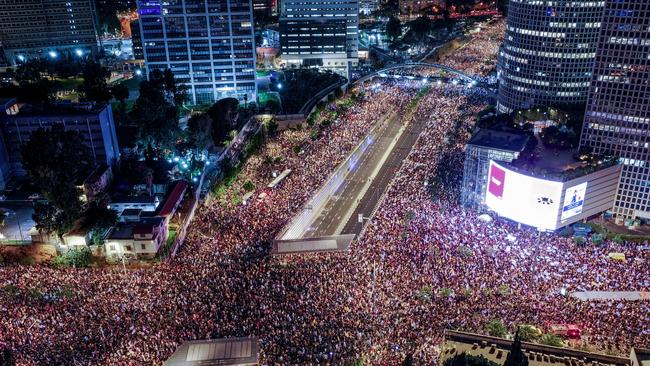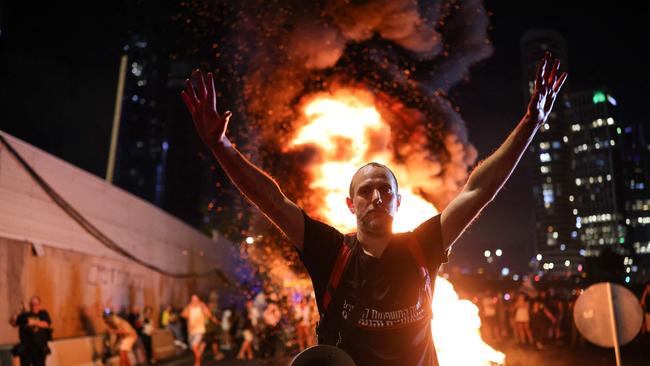Hostage deaths spark huge protest in Israel, calls for deal with Hamas
The Israeli military says the hostages were killed shortly before being found. Large protests erupted in Tel Aviv in favour of ceasefire deal.

The Israeli military said six bodies found in Gaza were hostages killed by Hamas, engulfing the country in grief and anger and deepening fissures over whether Prime Minister Benjamin Netanyahu’s government should have reached a ceasefire agreement that might have saved their lives.
The two women and four men whose bodies were recovered from a tunnel beneath the Gaza city of Rafah included American-Israeli Hersh Goldberg-Polin, whose family had waged an almost 11-month campaign for a ceasefire deal to bring him and dozens of other hostages home.
The six hostages were shot at close range some 48-72 hours before being found, Israel’s health ministry said, citing the results of a preliminary forensic exam.
The discovery of the bodies after months of stalled ceasefire talks prompted tens of thousands to join an impromptu protest Sunday night in central Tel Aviv as well as calls from Israel’s largest union and some Israeli universities for a nationwide strike on Monday.
Some members of Netanyahu’s own coalition demanded the pursuit of a deal with Hamas to return at least some of the remaining 97 hostages as soon as possible.
At the protest, a sea of Israeli flags blanketed the main highway junction near the country’s defence ministry, and six caskets draped in Israeli flags sat on a dais where speakers demanded the government strike a deal with Hamas to free the rest of the hostages.
Some held signs stating “They were alive,” “Stop the war” and “Bring them home now.” Police used water cannons and flash grenades against protesters they said were blocking traffic.
For Israel, the killings sharpened divisions between those who favour an immediate deal and those who think defeating Hamas is more important. For Hamas, having fewer live hostages reduces the bargaining power it has for reaching an agreement.
“My heart was broken into pieces when I heard the news,” said Rotem Prost, 29 years old, from Tel Aviv. “People who lived so long through such tough conditions were killed for no cause and without justice,” she said.
Shaked Moshagov, 23, said she felt abandoned by the government when she heard the six hostages had been killed.
“When I heard this was happening,” she said of the protest she was attending, “I knew I had to show up. Even if it won’t change anything.” Netanyahu said in a video message Sunday he was “personally committed” to reaching a deal that frees the remaining hostages and guarantees Israeli security. He accused Hamas of foiling the negotiations. “Whoever kills hostages doesn’t want a deal,” Netanyahu said.
Goldberg-Polin, 23, and Eden Yerushalmi, 24, Carmel Gat, 40, Almog Sarusi, 27, Alexander Lobanov, 32, and Ori Danino, 25, were “brutally murdered” by Hamas shortly before they were found by Israeli soldiers, Rear Adm. Daniel Hagari, the chief military spokesman, said in a statement Sunday.

Netanyahu called Lobanov’s parents ahead of the slain hostage’s funeral on Sunday. “I would like to tell you how much I regret and request forgiveness for not succeeding in bringing Sasha back alive,” he told them, according to Netanyahu’s office.
Hamas blamed the hostages’ deaths on Israel and the US, saying they had been killed by airstrikes. “The entity that kills our people daily is the occupation with American weapons, and the discovery of the bodies of prisoners in the Gaza Strip was a result of Zionist bombings,” it said in a statement.
Along with Netanyahu, Hamas leader Yahya Sinwar has resisted an agreement for months, negotiators and officials in their own camps say, even as pressure to strike a deal has been growing.
For both, military setbacks are mounting. Hamas has seen its fighting capabilities decimated across Gaza, while Israel is finding its forces stretched thin as it wages what amounts to a three-front war: in Gaza, against Hezbollah in southern Lebanon, and more recently against militants on the West Bank.
In Washington, US President Joe Biden vowed to make Hamas pay for the killings and said the US would continue to try to broker an agreement between Israel and Hamas to at least temporarily halt the fighting and secure the release of the remaining hostages, along with Palestinians held in Israeli prisons.
“I am devastated and outraged,” Biden said in a statement. “Make no mistake, Hamas leaders will pay for these crimes. And we will keep working around the clock for a deal to secure the release of the remaining hostages.” Biden spoke with Goldberg-Polin’s parents, Jon and Rachel, on Sunday to offer his condolences, a White House official said. Vice President Kamala Harris said on X that she, too, spoke with the parents.
Former president Donald Trump took to social media and called the deaths “senseless.” Trump sought to blame Harris – his Democratic opponent in the November presidential election – and Biden for the deaths, calling Harris and Biden “poor leaders.” Goldberg-Polin, who was kidnapped from the Nova music festival in southern Israel on October 7, was seen alive in a video released by Hamas in late April. His forearm had been blown off in the attack.
But the US might still be reluctant to pressure Netanyahu too heavily to make concessions to Hamas, fearing it could hurt Harris’s presidential campaign if the White House is seen as forcing Netanyahu into a deal, said Aaron David Miller, a senior fellow at the Carnegie Endowment for International Peace, a Washington think tank.
“The administration is in a box. Seventy days before what could prove to be one of the more consequential elections in modern American history, it’s hard for me to see the administration upping the pressure, actually using tangible concrete levers,” he said.
Recent polling from the Israel Democracy Institute, a Jerusalem-based think tank, found that 82 per cent of Israelis supported a deal of some form to return hostages. Polling by the institute has found that a majority of Israelis have supported a deal for months. But they remain divided over the conditions.
“There are people who say we have to get the hostages back; others who say you have to continue the war to secure the south,” said Michael Oren, a former Israeli ambassador to the US. “It’s been the same thing since day one of the war, nothing’s changed.” Gil Dickmann, a cousin of deceased hostage Carmel Gat, said that Netanyahu and the government were at fault for failing to agree to a hostage deal. “We know Carmel could have come back if a deal was made in time,” he said. “We weren’t able to save her and the others in time.” Israel’s top security officials, including Defense Minister Yoav Gallant, have pushed the government to agree to a ceasefire deal, saying the hostages can’t all be saved through military operations.
Gallant on Sunday called for the nation’s cabinet to reverse a decision made on Thursday for Israeli forces to remain permanently along the Gaza-Egypt border. Hamas has said it would oppose any deal that included keeping Israeli troops stationed in the area.
“It’s too late for the hostages that were murdered in cold blood. We must bring home the hostages left in Hamas captivity,” Gallant said.
One of the sticking points in the ceasefire talks is Netanyahu’s insistence that pulling troops from the Philadelphi Corridor, which divides Gaza from Egypt; the Rafah border crossing, which connects the two; and the Netzarim Corridor, which cuts across the enclave, would allow Hamas to reconstitute.
Hard-line members of Netanyahu’s coalition, who have long been sceptical about an agreement that would halt the war before Hamas is defeated, have threatened to bring down his government by breaking with him and forcing snap elections.
He also has to weigh the likelihood that Hamas will agree to release the hostages it still controls. On Tuesday, Israeli troops came across a hostage, 52-year-old Qaid Farhan Al-Qadi, who was still alive in a tunnel in southern Gaza after being taken prisoner more than 10 months ago.
But many others whom Israel is finding are already dead. Israel has retrieved the bodies of 13 hostages in the past two weeks alone, raising concerns about the fate of those still held in Gaza.
Summer Said contributed to this article.
The Wall Street Journal



To join the conversation, please log in. Don't have an account? Register
Join the conversation, you are commenting as Logout